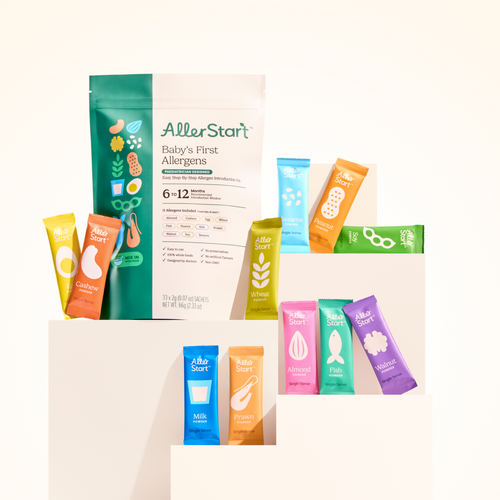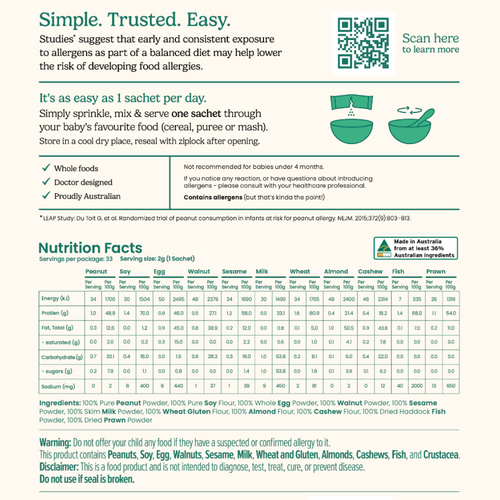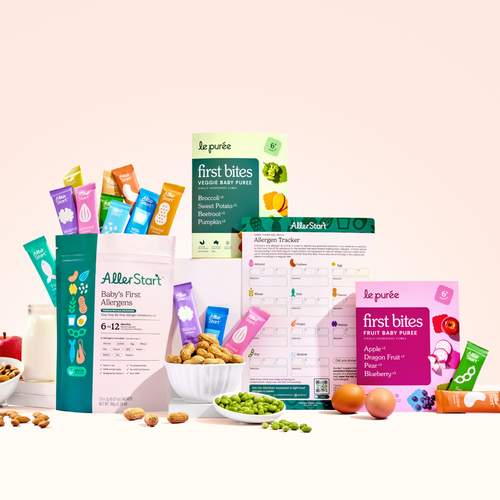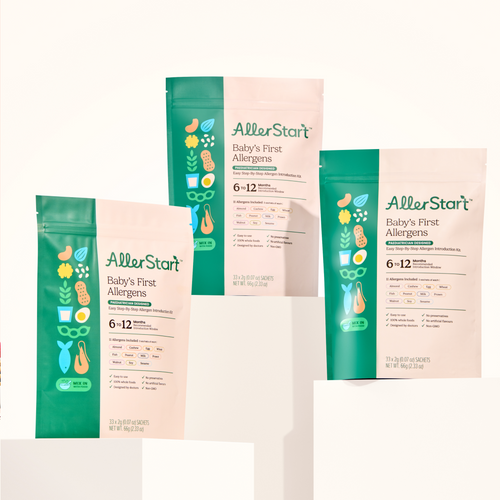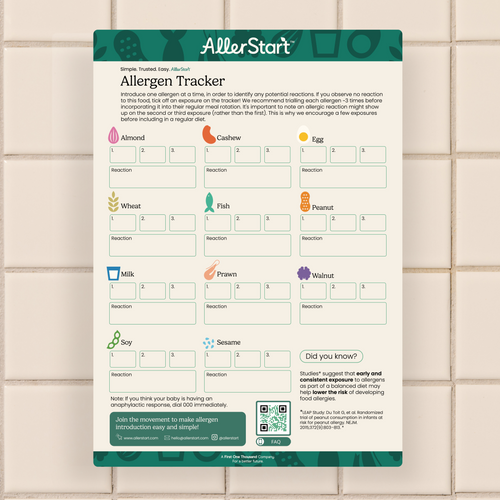Firstly (not point 1, that’s below) I want to clarify something, these are the first 5 things to come into my mind, as a doctor/parent, when I was asked about introducing allergens recently. No ChatGPT, no research, these are my true thoughts that came to mind when our marketing team asked me this exact question while on camera (reel to come☺). I wanted to add a bit more context, fill in the gaps a bit, so I’ve created this blog. I hope you find it helpful.
Right, where were we, the 5 things you should know about introducing food allergens

1. Start giving your baby allergens around the time you start giving your baby solids. 👶🏼
There is no benefit of delaying, in fact we know that delaying the introduction of food allergens can actually increase the risk of developing lifelong allergies. We know from parts of the world like Israel and Thailand, where peanut is consumed from a very early age, that the rates of peanut allergy in those countries is near zero. Early introduction and regularly eating the common food allergens was a proposed explanation for the low rates of allergies until it was proven by a game changing study published in the New England Journal of Medicine in 2015. Since then, guidelines all over the world recommend early introduction of the common allergens.
What if your baby has eczema? Even more reason to start early! Remember that ‘game changing’ study I just mentioned. They actually looked at exactly that. They took babies who were at high risk of food allergies with either eczema, egg allergy or both and put them into two groups. One group regularly had peanut and one group abstained from having any peanut. What they found is that even in children with severe eczema the rate of lifelong peanut allergy plummeted when peanut was introduced early and given often. Take home: if your baby has eczema, even more reason to start early☺
2. Introduce one allergen at a time. 🥜
Something that Dr. Mariam and I commonly see is babies or children that have an allergic reaction to a food and the parents are not sure what ingredient caused the reaction. As a result they stop giving all of the common allergens. This is a big problem. That’s because by not introducing and regularly giving the foods your baby is not allergic to, they can actually develop a food allergy! That’s why it is so important to start with one allergen at a time, so if your baby does have a reaction, you can continue to give them the other allergens to reduce their risk of developing a reaction to those foods.
3. If your baby has no reaction, keep giving the food to your baby. 🙌🏼
The science tells us that early introduction reduces the risk of life long allergy, but research also tells us that regularly eating the common food allergens further reduces that risk.
The body’s immune system is a wonderful thing. Unfortunately, when it comes to allergies the immune system is sort of like a toddler. It needs to be taught what to do. And we teach our immune system to recognise the common food allergens as nutritious foods rather than nasty parasites by eating the foods regularly from an early age.
Because the immune system has to learn how to respond to allergens, giving the food just once isn’t quite enough. It takes at least one, but sometimes a few exposures for your body to be ‘sensitised’ to the food. Sensitised is a nerds way of saying, the body recognising and deciding how it’s going to respond to the food the next time. In the majority of cases, the next response is a good one, in allergies, the response is not so good. More posts to come where you’ll see my true science nerd colours and I’ll explain the immune system in allergies in a bit more detail.
4. Do not introduce the allergen by rubbing it on the skin 🛑
Contrary to the old wives’ tale of rubbing a small amount of food on your babies skin to give it for the first time, this can actually increase your child’s risk of developing a food allergy!
Again, without getting too scientific, think of the immune system like a house. If someone knocks on your front door (a food to your mouth), you’re likely to welcome them in. Now, if that same person (food), came in through your bedroom window (the skin), the alarms go off and the police are called. That’s the same theory that is behind food allergies. When the allergy causing foods are exposed to the body for the first time through the skin, the immune system recognises them as a bad thing, like a jelly fish sting, a bee sting or a parasite! In fact, food allergies cause the exact same immune response involving cells called mast-cells that release histamine and other chemicals that cause the symptoms of allergic reactions and anaphylaxis.
5. Don’t worry! 🤗
When it comes to introducing allergens you do not need to worry! Your baseline parenting instincts (and natural worries) are good enough, extra stress, extra worries are not required.
If you’re a soon-to-be parent you’re about to learn that you have these things called parental instincts. Unfortunately, these instincts can sometimes keep you up at night worrying about your kids, but they’re a good thing! In my career I have never met a parent who missed anaphylaxis...
It may not have been clear at the time that the symptoms their child was experiencing was anaphylaxis but the parent still had their child seen by a doctor. At Taste Bubs we don’t want to create unnecessary fear to help sell our product. In fact, we strongly believe that part of the reason why parents delay introducing allergens and in turn why the rates of food allergies are so high is because there is too much fear in parents’ minds about a reaction and as a result they put off introducing allergens all together.
Lots of things we do as parents are scary. First foods, first steps, first days of school. Risks are around us at all times. As parents, all we can do is be prepared and be there for our kids when things don’t go to plan. Same applies when introducing the allergens. There is always a small risk, even when using Taste Bubs. But don’t be scared, just be prepared and trust me, your parental instincts will take over and you will not miss the signs of anaphylaxis.



